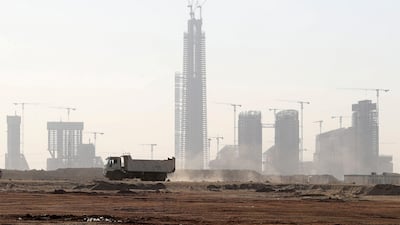Egypt is putting an end to loss-making state-owned enterprises and turning to the private sector to fuel economic recovery, Public Enterprise Minister Hisham Tawfik said.
“Our message now to the economy and to the masses is that we are partnering with the private sector, wherever possible,” Mr Tawfik said during an International Monetary Fund webinar on Wednesday.
The discussion centred around the IMF’s latest report on how countries in the Middle East, North Africa and Central Asia can reform state-owned enterprises.
“The purpose of this study is to help countries deal with two important issues: accelerate their recovery in the post-Covid era and also prepare for the great transformation that those economies will need in order to build the future for the next five to 10 years,” said Jihad Azour, IMF director of the Middle East and Central Asia department.
Egypt’s sizeable state-owned enterprises (SOEs) have come at a high cost, which is magnified as the Arab world's third-largest economy grapples with the effects of Covid-19.
“Right now there’s definitely some pressure on the government in terms of liquidity and access to capital and it’s preferable for them to raise that capital from private markets instead of putting additional strain on state banks or their cash flow,” Timothy Kaldas, policy fellow at The Tahrir Institute for Middle East Policy, told The National.
Egypt had identified 23 state-owned companies in 2018 that could be listed on the Egyptian stock exchange or potentially sell additional stakes, but the pandemic contributed to delays.
The government recently said it would resume its initial public offering programme by the end of this year and has been stepping up private partnerships.
Earlier this week, state-run electronic payments firm e-Finance said it will offer up to 14.5 per cent of its capital in an IPO in the fourth quarter of this year.
In 2022, Egypt may also sell a stake in the Administrative Capital for Urban Development, a joint venture between the Egyptian military and the Housing Ministry, in what could be Egypt’s biggest IPO.
Mr Tawfik said the government has been implementing reforms over the past couple of years to enhance governance, fiscal implications and performance.
“We have changed the law governing the state-owned enterprises and we have introduced what should have been introduced 30 years ago to make sure that we have proper governance,” he said.
Reforms include putting standardised procedures in place for all state-owned enterprises, setting minimum basic wages and linking excess payments to the performance and profits of the company.
“We have put an end to the loss-making companies. Now by law, it’s not up to the general assembly, it’s not up to the minister, it’s not up to the President even to allow loss-making companies to continue,” Mr Tawfik said.
“Within three years, they either have a turnaround or they are forced to liquidate.”
He said the government has liquidated “four big entities”, without specifying which ones.
The Egyptian Iron and Steel Company was shut down earlier this year in anticipation of liquidation plans, but a Ukrainian firm made an offer in June to modernise and operate the state-owned enterprise that employs 7,000 workers.
“We have set the tone that for state-owned enterprises to continue, they have to have a very clear business model and they have to do the necessary restructuring,” Mr Tawfik said. “They have to come back and make profits.”
Egypt’s SOEs are present in almost every sector of the economy, including logistics, agriculture, oil and gas, electricity and energy.
There are more than 300 publicly-owned companies, close to 645 joint ventures and partnerships involving the state and 53 economic authorities in Egypt, according to a June IMF report.
“It is not the intention to have a large number of state-owned enterprises, but this is a fact and we have to live with it,” Mr Tawfik said.
He said the government is now open to all forms of private sector partnership, such as equity participation, profit-sharing and operation and maintenance contracts.
The number of SOEs in the Mena and Central Asia region is on average higher than in member countries of the Organisation for Economic Co-operation and Development, the IMF report published this week said.
“In certain countries it could reach hundreds and in a few cases, it could go up to thousands,” said Mr Azour of the IMF.
Alan Rousso, managing director of external relations and partnerships at the European Bank for Reconstruction and Development, said the situation “is a significant feature in the region and it doesn’t appear to be going anywhere anytime soon”.
He emphasised the importance of increasing transparency, establishing sound company governance, and creating a level playing field among state and privately-owned companies.
“If countries get these things right, SOEs can deliver broader benefits for society and the economy,” Mr Rousso said.
“If they get them wrong, SOEs can hamper productivity growth, innovation and promote distortions due to political interference.”


